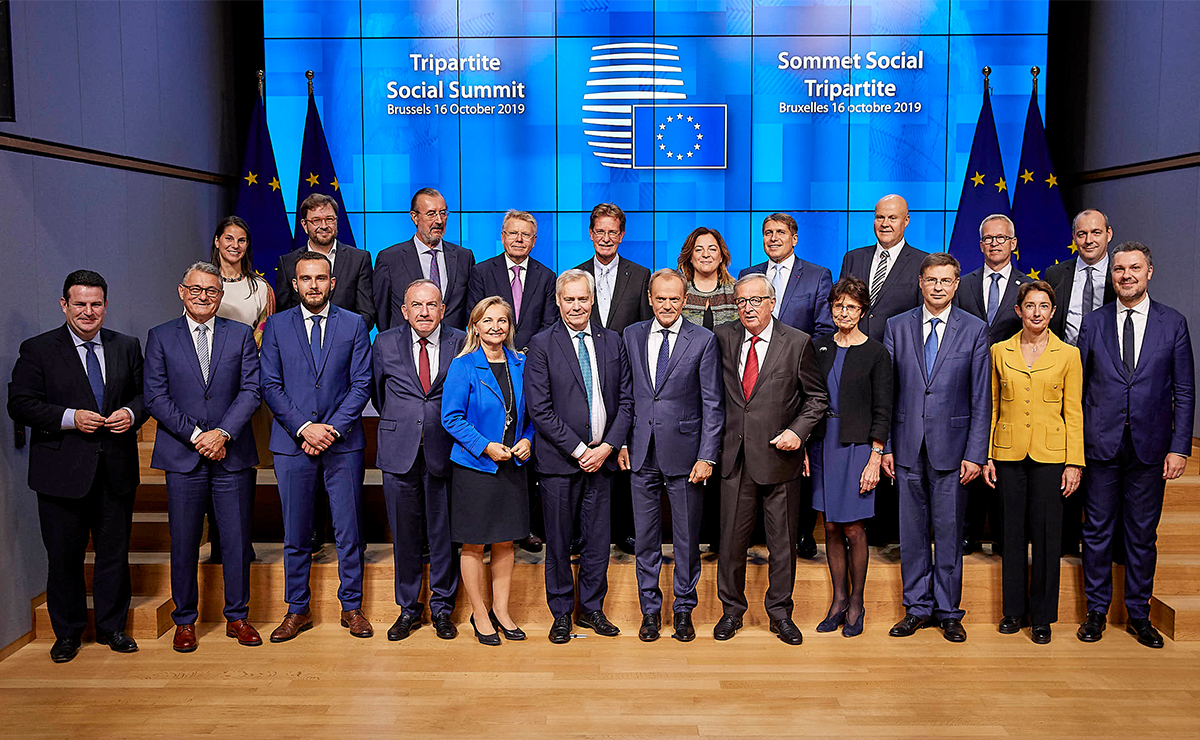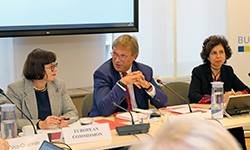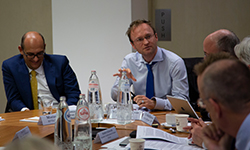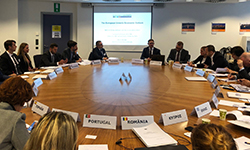BusinessEurope Headlines No. 2019-32
Gattaz: urgent need to put our economic house in order

“A strong economy is key to build a fair and sustainable Europe”, BusinessEurope's President Pierre Gattaz said at the Tripartite Social Summit on 16 October in Brussels. The main topic of the summit was "Progressing on the social and economic dimensions for a competitive, fair and sustainable Europe: The role of social partners and social dialogue". President Gattaz added that “the economic outlook is deteriorating. It is more urgent than ever to put our economic house in order. European companies are delivering solutions to ensure prosperity, while taking care of people and the planet. But to fully play their role in society, they need a supportive environment”. Getting the social dimension right is crucial if the EU is to deliver for people. Important priorities in this respect are to better meet companies’ changing skills needs, and to ensure the sustainability of national social protection in Europe.
Contact: Maxime Cerutti
Photo copyright: European Union
Our comment
Resetting the EU trade agenda
By Luisa Santos, Director for International Relations
 Soon we will be starting a new institutional cycle in the EU but many of the issues at the top of our trade agenda will not change. We might find new ways of addressing some of these issues though.
Soon we will be starting a new institutional cycle in the EU but many of the issues at the top of our trade agenda will not change. We might find new ways of addressing some of these issues though.
It is clear that we have to address the trade irritants in the transatlantic relation while ensuring that our trade and investment flows remain strong. Trust is the basis for investment and job creation and therefore a key element in EU-USA relations. Addressing existing conflicts like the Airbus/Boeing dispute is a way to build a positive agenda and give companies the trust they need to continue to trade and invest. It is clear that we cannot go back to TTIP times but why not expand the scope of bilateral negotiations to include agricultural products provided the USA is also willing to discuss public procurement?
China will remain a key market for Europe in the short and medium term. But China also needs to recognise the EU as an important trading partner, one with which it is ready to eliminate investment barriers and improve market access. Maybe for this to happen the EU also needs to change its approach by creating additional negotiation leverage. For instance, by addressing more effectively the market distortions that are generated by the Chinese economic model.
The EU needs to remain an ambitious player in the world when it comes to rule setting. For instance, we are now discussing what trade can do more to support climate. The EU can take a leadership role in convincing others that they need to do more and above all that they should respect their international commitments including the Paris Agreement.
Another area where the EU should do more is on digital trade. The digital revolution is changing the trading world at a fast pace. Many are tempted to increase barriers as a way to address the digital challenges. We see forced data localisation provisions are increasing and some governments are considering the idea of taxing cross-border electronic transmissions. The EU has shown little ambition in its free trade agreements by preferring to have adequacy decisions instead of provisions on free flow of data. In the meantime, others are going ahead setting very comprehensive rules like it has been recently the case for Japan and the USA. If the EU wants to take leadership on rule-setting in the international trade arena it needs also to revisit its position on data flows. This will allow the EU to be a more active and ambitious player both at bilateral level but also multilaterally in the context of the e-commerce negotiations in the World Trade Organisation (WTO).
These topics were discussed with Sabine Weyand, Director General of the European Commission’s Directorate-General for Trade at an event on 16 October at BusinessEurope.
Contact: Luisa Santos
What companies need on research and innovation
 “The EU has rightly moved forward its research and innovation agenda”, said Alexandre Affre, Director for Industrial Affairs, at the event EU Research and Innovation: are we investing smartly? on 15 October in Brussels. He explained that from strictly science-focused Framework Programmes, today’s funds also look at the innovation’s side, and welcomed the European Commission’s approach in focusing more on market-based requests. Building on the BusinessEurope’s paper on research and innovation, he suggested reducing bureaucracy and the time to give grants in order to attract more companies to EU funds. “If we want to address societal challenges, we need to bring solutions to the market and therefore involve companies”.
“The EU has rightly moved forward its research and innovation agenda”, said Alexandre Affre, Director for Industrial Affairs, at the event EU Research and Innovation: are we investing smartly? on 15 October in Brussels. He explained that from strictly science-focused Framework Programmes, today’s funds also look at the innovation’s side, and welcomed the European Commission’s approach in focusing more on market-based requests. Building on the BusinessEurope’s paper on research and innovation, he suggested reducing bureaucracy and the time to give grants in order to attract more companies to EU funds. “If we want to address societal challenges, we need to bring solutions to the market and therefore involve companies”.
![]() Contact: Carolina Vigo
Contact: Carolina Vigo
Debating tax competitiveness
 “European corporate tax regimes must remain competitive to attract global investors” - this was the key message of James Watson, Economics Director at BusinessEurope, at a seminar on “Competitive Taxation in Europe - New Evidence for EU Tax Policymakers”, organised by the European Centre for International Political Economy (ECIPE) on 14 October. Alongside Daniel Bunn (Director at Tax Foundation), Jacob Lundberg (Chief Economist at Timbro) and Mattias Bauer (Senior Economist at ECIPE), James noted that EU Member States should continue their efforts to ensure the administration of their tax systems becomes simpler, more transparent and user-friendly, in particular the corporate tax, which is particularly damaging to growth and employment, according to a new EESC study. Furthermore, he noted that the debate on corporate tax would be particularly improved by broader impact assessments and a wider understanding of taxation incidence.
“European corporate tax regimes must remain competitive to attract global investors” - this was the key message of James Watson, Economics Director at BusinessEurope, at a seminar on “Competitive Taxation in Europe - New Evidence for EU Tax Policymakers”, organised by the European Centre for International Political Economy (ECIPE) on 14 October. Alongside Daniel Bunn (Director at Tax Foundation), Jacob Lundberg (Chief Economist at Timbro) and Mattias Bauer (Senior Economist at ECIPE), James noted that EU Member States should continue their efforts to ensure the administration of their tax systems becomes simpler, more transparent and user-friendly, in particular the corporate tax, which is particularly damaging to growth and employment, according to a new EESC study. Furthermore, he noted that the debate on corporate tax would be particularly improved by broader impact assessments and a wider understanding of taxation incidence.
Contact: Pieter Baert
The future Single Market agenda
 BusinessEurope’s Internal Market Director Martynas Barysas presented challenges and priorities for the Single Market in the EU’s new political cycle at the EFTA Consultative Committee (EFTA CC) discussion on the future Single Market agenda, held on 14 October in Brussels. The EFTA CC consists of representatives of the social partners coming from Iceland, Liechtenstein, Norway and Switzerland. Geo-political importance of the EU Single Market in the intensified rivalry among the biggest world economies, as well as the need for further integration, digitalisation and better governance of the EU economy were pointed out. Some related social policy issues were raised. Barysas stated that a pre-requisite for the economic-social convergence in the EU is the efficiently functioning Single Market with its freedoms. However, it would not solve all issues alone and structural reforms in the Member States have to go hand in hand. The Single Market agenda in the future should largely focus on two pillars: first, better governance, meaning a lot of improvement in implementation of the existing rules by Member States, their cooperation and enforcement at both EU and national levels; second, more Single Market integration in the areas that can give another boost to the EU’s economic strength and where political agreement could be achieved. “It is unfortunate to hear about a certain split in the Council among Members States calling themselves, on one side, the ‘friends of industry’ and the ‘Single Market like-minded’ on the other”, Barysas said, adding that “This is wrong, and we should rather look for feasible Single Market solutions that benefit Europe’s competitive strength as a whole, like for example further integration of engineering, logistics or cloud services that contribute to the manufacturing”. He stressed the necessity to always highlight consistency of decisions on digital economy, services and industry so that those decisions do not impede cross-border business operations. Barysas also presented BusinessEurope’s strategy paper on Priorities for the Single Market beyond 2019. Representatives of the EFTA Secretariat, EPC think-tank, ETUC and BusinessEurope participated in the panel discussion, which was followed by a debate with EFTA CC members. The panellists agreed on challenges for the Single Market and some solutions but also dangers of rushed decisions, including some of the planned initiatives within 100 days of the new Commission. At the same time, opinions diverged on the way forward with some of the social policy choices such as the minimum wage harmonisation idea which was not supported by employers as well as some trade union representatives in the event.
BusinessEurope’s Internal Market Director Martynas Barysas presented challenges and priorities for the Single Market in the EU’s new political cycle at the EFTA Consultative Committee (EFTA CC) discussion on the future Single Market agenda, held on 14 October in Brussels. The EFTA CC consists of representatives of the social partners coming from Iceland, Liechtenstein, Norway and Switzerland. Geo-political importance of the EU Single Market in the intensified rivalry among the biggest world economies, as well as the need for further integration, digitalisation and better governance of the EU economy were pointed out. Some related social policy issues were raised. Barysas stated that a pre-requisite for the economic-social convergence in the EU is the efficiently functioning Single Market with its freedoms. However, it would not solve all issues alone and structural reforms in the Member States have to go hand in hand. The Single Market agenda in the future should largely focus on two pillars: first, better governance, meaning a lot of improvement in implementation of the existing rules by Member States, their cooperation and enforcement at both EU and national levels; second, more Single Market integration in the areas that can give another boost to the EU’s economic strength and where political agreement could be achieved. “It is unfortunate to hear about a certain split in the Council among Members States calling themselves, on one side, the ‘friends of industry’ and the ‘Single Market like-minded’ on the other”, Barysas said, adding that “This is wrong, and we should rather look for feasible Single Market solutions that benefit Europe’s competitive strength as a whole, like for example further integration of engineering, logistics or cloud services that contribute to the manufacturing”. He stressed the necessity to always highlight consistency of decisions on digital economy, services and industry so that those decisions do not impede cross-border business operations. Barysas also presented BusinessEurope’s strategy paper on Priorities for the Single Market beyond 2019. Representatives of the EFTA Secretariat, EPC think-tank, ETUC and BusinessEurope participated in the panel discussion, which was followed by a debate with EFTA CC members. The panellists agreed on challenges for the Single Market and some solutions but also dangers of rushed decisions, including some of the planned initiatives within 100 days of the new Commission. At the same time, opinions diverged on the way forward with some of the social policy choices such as the minimum wage harmonisation idea which was not supported by employers as well as some trade union representatives in the event.
![]() Contact: Martynas Barysas
Contact: Martynas Barysas
Photo copyright: EFTA Secretariat
Apprenticeships increasingly important for up-skilling and re-skilling workers
 Apprenticeships for adults can play an important role in up-skilling and re-skilling workers in a way that helps to address employers' evolving skills needs. Whereas apprenticeships that take place as part of initial vocational training combine the provision of transversal and technical skills, apprenticeships for adult learners can put more emphasis on occupation-specific skills, which can help to reduce skills mismatches and labour shortages. This was one of the key messages given by Robert Plummer, Senior Social Affairs Adviser, during the course of the European Vocational Skills Week activities that took place in Helsinki on 15 October.
Apprenticeships for adults can play an important role in up-skilling and re-skilling workers in a way that helps to address employers' evolving skills needs. Whereas apprenticeships that take place as part of initial vocational training combine the provision of transversal and technical skills, apprenticeships for adult learners can put more emphasis on occupation-specific skills, which can help to reduce skills mismatches and labour shortages. This was one of the key messages given by Robert Plummer, Senior Social Affairs Adviser, during the course of the European Vocational Skills Week activities that took place in Helsinki on 15 October.
Contact: Robert Plummer
Ambitious growth agenda needed to counter slowdown

“Europe’s economies are losing their growth momentum as a result of trade tensions and heightened regional and global uncertainty, and in response policymakers must redouble their efforts to push for more growth-friendly policies that will increase the competitiveness of our businesses and ensure our longer-run prosperity”. That was the key message of BusinessEurope Senior Economist Malthe Munkoe at an European Commission event on 16 October. Speaking at a seminar with representatives of the business community and the Commission, he noted that policymakers should implement growth-enhancing policies and reforms at EU Member State and European levels, for example by shifting more expenditure both on national budgets and in the context of the ongoing Multiannual Financial Framework negotiations towards growth-enhancing spending. Malthe also stressed that Europe will jeopardize its economic future if it fails to fully embrace and invest in the digital and technological transformation that is so rapidly reshaping our world. BusinessEurope has highlighted the need for growth reforms and suggested ways forward for policymakers in its Reform Barometer.
![]() Contact: Malthe Munkoe
Contact: Malthe Munkoe
Calendar
- 14-20 October: IMF general meeting
- 17-18 October: European Council
- 21 October: Canadian elections
- 24 October: Employment, Social Policy, Health and Consumer Affairs Council
Reminder: please have a look at our privacy policy